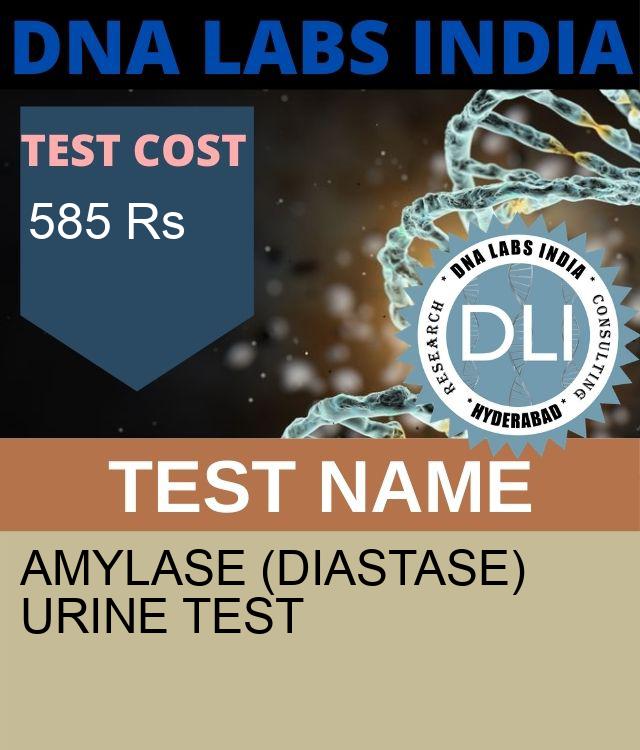Why to get tested at DNA Labs India for AMYLASE (DIASTASE) URINE Test ?
Book Now
-
3500 Sample collection centers, Free Home Sample
collection for AMYLASE (DIASTASE) URINE Test in your city
-
Ranked India No1 DNA Test Lab for
AMYLASE (DIASTASE) URINE Test
-
Most Trusted Lab by doctors for AMYLASE (DIASTASE) URINE Test. Call 07941057551 to talk with Doctor to
get second opinion for free of cost
-
AMYLASE (DIASTASE) URINE Test Cost 585 Rs
AMYLASE (DIASTASE) URINE Test Details
AMYLASE (DIASTASE) URINE Test: Cost, Symptoms, and Diagnosis
AMYLASE (DIASTASE) URINE Test is a medical test that measures the level of amylase in the urine. Amylase is an enzyme that helps break down carbohydrates in the body. This test is usually done to diagnose pancreatitis, an inflammation of the pancreas.
Symptoms of Pancreatitis
The symptoms of pancreatitis include:
- Severe abdominal pain
- Nausea and vomiting
- Fever
- Rapid heartbeat
- Swollen and tender abdomen
Diagnosis of Pancreatitis
The diagnosis of pancreatitis usually involves a physical exam and blood tests. The doctor may also order an AMYLASE (DIASTASE) URINE Test to confirm the diagnosis.
AMYLASE (DIASTASE) URINE Test Cost
The cost of an AMYLASE (DIASTASE) URINE Test in India is INR 585. However, the cost may vary depending on the location and the lab.
How is the AMYLASE (DIASTASE) URINE Test Done?
The AMYLASE (DIASTASE) URINE Test is a simple and non-invasive test that can be done at any lab. The patient will be asked to provide a urine sample, and the sample will be sent to the lab for analysis. The results of the test will be available within a day or two.
Conclusion
The AMYLASE (DIASTASE) URINE Test is an important diagnostic tool for pancreatitis. It is a simple and non-invasive test that can be done at any lab. The cost of the test is affordable, and the results are usually available within a day or two. If you are experiencing symptoms of pancreatitis, it is important to consult a doctor and get the necessary tests done.
At DNA Labs India, we offer a wide range of medical tests, including the AMYLASE (DIASTASE) URINE Test. Our labs are equipped with state-of-the-art technology, and our team of experts is dedicated to providing accurate and reliable results. To book a test or to know more about our services, please visit our website.
Stay healthy and take care!
The amylase (diastase) urine test is a medical test used to measure the levels of amylase enzyme in a person's urine. Amylase is an enzyme produced by the pancreas and salivary glands that plays a role in breaking down complex carbohydrates into simpler sugars. This test is used to evaluate pancreatic function and diagnose conditions that may affect the pancreas or other parts of the digestive system.
Here's how the amylase urine test generally works:
-
Sample Collection: A urine sample is collected from the individual undergoing testing. This sample is usually collected over a specific period, often 24 hours, to provide a more accurate representation of amylase levels.
-
Test Method: The collected urine sample is analyzed to measure the concentration of amylase present. This is typically done using colorimetric methods, enzymatic assays, or other laboratory techniques.
-
Results Interpretation: The test results will indicate the concentration of amylase in the urine, often reported in units per volume (e.g., units per liter). Normal reference ranges can vary, but elevated levels of amylase in the urine may suggest various medical conditions.
The amylase urine test is commonly used to:
- Diagnose and monitor pancreatitis: Pancreatitis is inflammation of the pancreas. Elevated levels of amylase in the urine can be an indicator of pancreatitis, which can be acute or chronic.
- Detect other pancreatic disorders: Conditions such as pancreatic pseudocysts or pancreatic cancer can also lead to increased amylase levels.
- Assess salivary gland function: In some cases, the test can also help diagnose disorders affecting the salivary glands.
It's important to note that while the amylase urine test can provide valuable information, it is often used in conjunction with other tests and clinical assessments to arrive at a diagnosis. Elevated amylase levels can also occur for reasons unrelated to the pancreas, such as kidney disease or other conditions.
As with any medical test, the results should be interpreted by a qualified healthcare professional who can consider the entire clinical picture and guide appropriate further testing or treatment based on the results.
